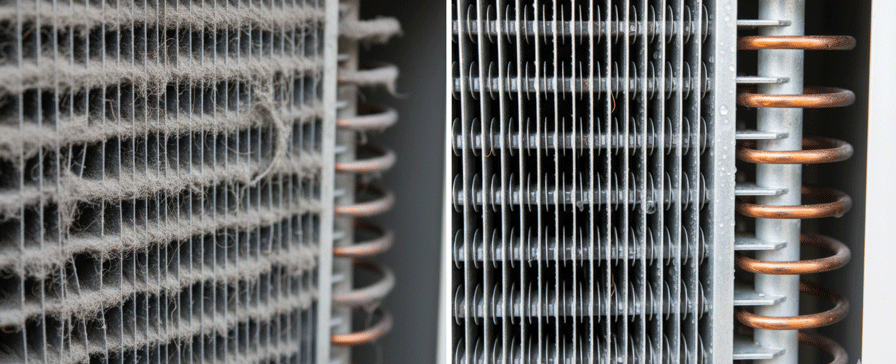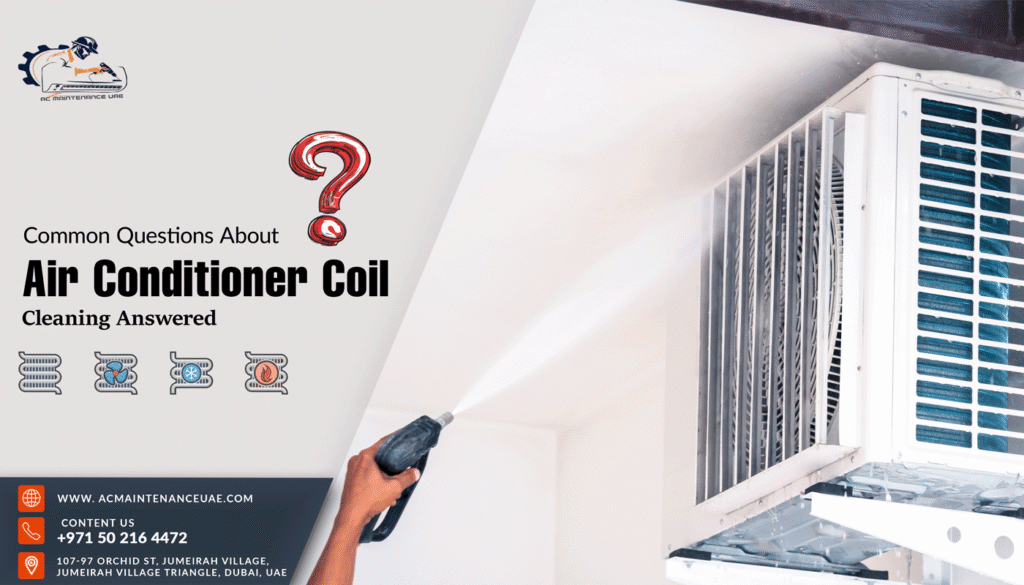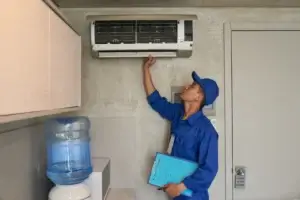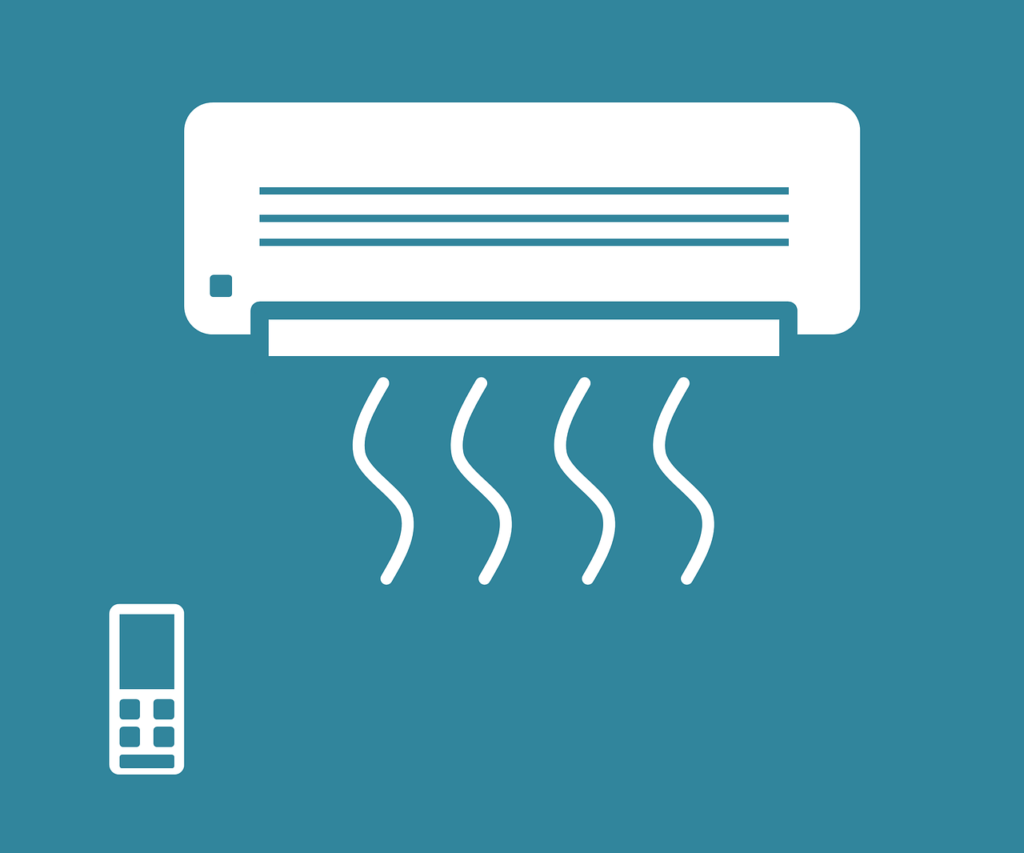Are you finding it hard to cool your house with your AC, but your utility bills are continuing to rise? Poor performance of the cooling can often be caused by dirty coils as well as higher operating costs. This is a complete resource that will answer the most frequent questions related to air conditioner coil cleaning and AC coil maintenance, and assist you in knowing when, why, and how to maintain your system to save energy and increase its performance.
Why Coil Cleaning Is Essential for AC Performance

The air conditioner coil cleaning has a direct impact on your system’s ability to transfer heat. The dirt, dust, and debris on coils create an insulated layer, which requires your AC to exert more effort to achieve the same cooling effect.
Proper heat exchange is afforded by clean coils, preserving up to 30% of your energy use and extending the life of your unit. Timely cleaning of the evaporator coil and the condenser coil avoids expensive repairs and ensures good indoor comfort throughout the year.
5 Common Questions About Air Conditioner Coil Cleaning
The most common question that homeowners ask is the frequency of cleaning, the cost, DIY, and the signs of danger. These responses give viable tips on how to ensure maximum performance of the AC during the entire year.
Q1. How Often Should Air Conditioner Coil Cleaning Be Performed?
The majority of the HVAC experts suggest that the AC coils cleaning should be performed at least once a year, ideally, before the peak cooling season. Nevertheless, houses with dusty conditions may need to be cleaned more often (after every 6-8 months).
The causes of cleaning frequency include:
- Local level of pollution and quality of air.
- Furry and dander pets.
- Close to construction areas or highways.
Frequent AC coil cleaning prevents the accumulation, which becomes more difficult to dissolve with time.
Q2. What Distinguishes Evaporator Coil Cleaning from Condenser Coil Cleaning?

The cooling process in your AC system uses two primary coils. The indoor air heat is taken up in the evaporator coil, and the outside air heat is expelled by the condenser coil. Both coils should be clean and clear to avoid obstruction to the flow of refrigerant and the transfer of heat.
The evaporator coil cleaning is concentrated on the internal coil, which is found within your air handlers or furnace unit. This coil usually traps dust, pet hair, and indoor pollutants that are passing through your air filter system. Condenser coil cleaning deals with the outer unit coil, which is subjected to various problems, such as grass clippings, leaves, dirt, and weathering. The coil outside should be cleaned in different ways, because it is accessible and the debris that it collects.
Once a single coil has become dirty, the performance of the whole system is greatly diminished, causing an increase in utility bills and a decrease in the level of comfort.
Q3. Is Professional AC Coil Cleaning Better Than a DIY Approach?

Professional AC unit coil cleaning provides special equipment, appropriate cleaning agents, and expertise on the handling of fragile coil fins. Technicians can also reach difficult-to-reach areas easily without breaking the delicate components.
DIY cleaning would be a good choice for simple work, such as removing conspicuous debris on the outside of units. Simple basic condenser coil cleaning with garden hoses and coil cleaning sprays is very successful for many homeowners.
Q4. What Is the Typical Cost of AC Unit Coil Cleaning?

HVAC coil cleaning by a professional will range between AED 150 to 450 based on your system’s size, accessibility, and the labor costs in the area. Basic AC cleaning services begin at approximately 150 AED, and full-scale cleaning may go up to 450 AED and above when the maintenance required is extensive.
Cost factors include:
- System size and complexity
- Condition of the coil and difficulty in cleaning.
- Other maintenance services are carried out.
- Call-out fees (estimated cost of AED 100-150 to inspect)
DIY cleaning materials range between AED 75 to 185 for simple cleaning products and equipment. But risks of a bad cleaning method may lead to costly repairs that are much more than the price of professional cleaning, and the cost of paying a professional to clean is justified by the long-term maintenance of the system.
Q5. What Warning Signs Indicate the Need for HVAC Coil Cleaning?

A few symptoms indicate that your coils require immediate attention. The major signs of dirty coils on system performance include reduced cooling performance, high energy costs, and increased run time.
Physical signs include:
- Ice upon evaporator coils.
- External coils are showing dirt.
- Musty odors from vents
- Heated air supply registers.
These problems are usually observed by professional HVAC coil cleaning technicians during regular inspections, thus the need to maintain the coils on a regular schedule.
Step-by-Step Guide to Effective AC Coil Cleaning

The correct cleaning methods safeguard your investment and give maximum results. Systematic procedures are what make the cleaning safe and thorough, and do not harm delicate parts.
Preparing the AC Unit Before Cleaning
It is important to prepare for safety before starting any AC coil maintenance procedures. Always switch off your system in both the thermostat and the electrical panel to ensure that it does not start accidentally when cleaning.
Clean up the area surrounding the outside unit, including leaves and lawn clippings within 2 feet of the condenser. Beforehand, assemble the essential equipment, such as a coil cleaner, soft brushes, and protective equipment.
Cleaning Techniques for Efficient Coil Maintenance
Begin with the condenser coil on the outside first by taking out the fan assembly, where available. Clean the edges with a soft brush and start cleaning inside, working outward as this would not push dirt into the coil fins.
Spray in AC coil cleaning solution as per the instructions on the package, and allow to foam and enter the dirt. Wash with low-pressure water and ensure that all the cleaning residue is eliminated.
Professional AC Coil Maintenance Tips for Better Efficiency
Planned maintenance and intelligent upgrades are able to make coils last longer. Professional knowledge can be applied to optimize the performance of the system and lower the operating expenses of the system over time.
Scheduling Routine Inspections for Peak Performance
Develop a maintenance schedule with coil inspections at the start of spring and system tune-ups at the start of the fall. Professional technicians can identify the potential problem before it can negatively impact the functioning of the systems, or they can make an emergency repair.
Examine the status of the document coils each time you check them to see the pattern of wear and tear and to keep track of the cleaning frequency. Achieving success in such partnerships with local service providers like us, AC Maintenance UAE, many homeowners work out contracts helping to clean coils as part of a comprehensive system maintenance strategy.
Upgrades and Products That Extend Coil Life
Air filters that are highly efficient minimize the litter that gets to your evaporator coil, and this lengthens the intervals before you need to clean your air filters. However, make sure that your system can accommodate a higher resistance of the filters without impacting the airflow.
Coil coating products offer a protective coating against corrosion and allow for easier cleaning in the future. Change of filters after every 1-3 months enormously affects the maintainability of the coils and the efficiency of the system.
Issues During Air Conditioner Coil Cleaning
Prevention of damage and identification of incomplete cleaning will save expensive repairs. Awareness of the possible issues can be used to guarantee effective maintenance results each time.
Damage Risks from Harsh Chemicals or Tools
Cleaning procedures that are aggressive may cause permanent damage to the fragile coil fins, decreasing the effectiveness of heat transfer and airflow. The curved fins inhibit air flow and cause pressure differentials that make your system work harder.
Strong chemicals can cause the corrosion of coil materials or leave some residues to be collected by more dirt over time. Always apply cleaners that are specifically designed as AC unit coil cleaning agents and take care to follow dilution directions.
Symptoms of Poor or Incomplete Coil Cleaning
Sometimes, incomplete cleaning leaves some debris in inaccessible places where it still obstructs airflow and heat transfer. The systems can exhibit a short-term improvement after which they can deteriorate quickly.
The indicators of poor cleaning are:
- The formation of ice after cleaning.
- None of the cooling capacity improved.
- Persistent energy-wasting.
- Quickly visible dirt accumulation is removed.
Cleaning also takes time and good practices to be able to remove all the debris off the surfaces of the coils and fin space. When the process is rushed, there will be poor results that will need to be cleaned up again and again.
Final Thoughts on Maintaining Clean AC Coils
The consistent care brings long-term advantages to the efficiency of the system and coziness of the house. Acting now will save you future troubles and will help you maximize your AC investment. A regular air conditioner coil cleaning is necessary to ensure maximum performance, energy efficiency, and indoor comfort. Through appropriate AC coil cleaning, expensive repairs are avoided, and your system performs at its optimum efficiency during its design lifecycle.
AC Maintenance UAE Team
Welcome to AC Maintenance UAE, your reliable partner for complete air conditioning repair and maintenance services in Dubai, Sharjah, and Abu Dhabi. We are strongly dedicated to excellence and deliver efficient and reliable services to keep your cooling systems performing at their best.
- AC Maintenance UAE Team
- AC Maintenance UAE Team
- AC Maintenance UAE Team
- AC Maintenance UAE Team



